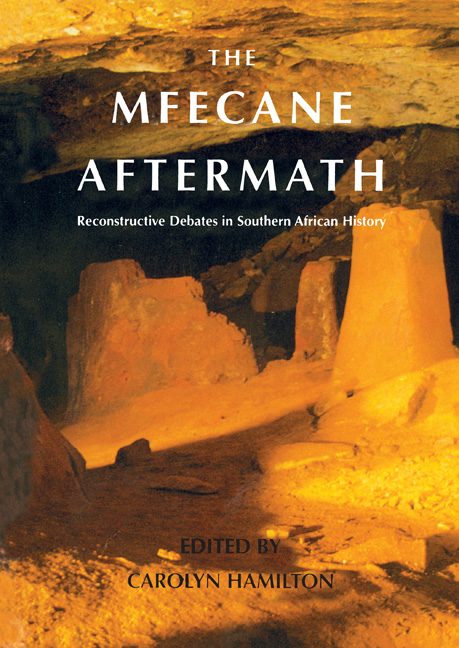Book contents
- Frontmatter
- Contents
- Maps
- Preface
- Acknowledgements
- Notes on Orthography and Names
- Contributors
- Introduction
- Part One Historiography and Methodology
- Putting the Mfecane Controversy into Historiographical Context
- 1 Pre-Cobbing Mfecane Historiography
- 2 Old Wine in New Bottles: The Persistence of Narrative Structures in the Historiography of the Mfecane and the Great Trek
- 3 Hunter-Gatherers, Traders and Slaves: The ‘Mfecane’ Impact on Bushmen, Their Ritual and Their Art
- 4 Language and Assassination: Cultural Negations in White Writers' Portrayal of Shaka and the Zulu
- Part Two The South-Eastern Coastal Region
- Part Three The Interior
- Glossary
- Abbreviations
- Bibliographer's Note
- Bibliography
- Complete List of Papers Presented at the Colloquium
- Index
4 - Language and Assassination: Cultural Negations in White Writers' Portrayal of Shaka and the Zulu
from Part One - Historiography and Methodology
Published online by Cambridge University Press: 31 May 2019
- Frontmatter
- Contents
- Maps
- Preface
- Acknowledgements
- Notes on Orthography and Names
- Contributors
- Introduction
- Part One Historiography and Methodology
- Putting the Mfecane Controversy into Historiographical Context
- 1 Pre-Cobbing Mfecane Historiography
- 2 Old Wine in New Bottles: The Persistence of Narrative Structures in the Historiography of the Mfecane and the Great Trek
- 3 Hunter-Gatherers, Traders and Slaves: The ‘Mfecane’ Impact on Bushmen, Their Ritual and Their Art
- 4 Language and Assassination: Cultural Negations in White Writers' Portrayal of Shaka and the Zulu
- Part Two The South-Eastern Coastal Region
- Part Three The Interior
- Glossary
- Abbreviations
- Bibliographer's Note
- Bibliography
- Complete List of Papers Presented at the Colloquium
- Index
Summary
The range of attitudes towards Shaka in ‘colonial’ writing is wide and tangled, but the strongest and most consistent has undoubtedly been one of ‘character assassination’. This has varied from the openly vicious (Nathaniel Isaacs and Elizabeth Watt) through the jarringly ambivalent (A.T. Bryant and E.A. Ritter) to the concealed (J. Omer-Cooper and L. Thompson). It runs counter to, and often in confused company with, the tendency to lionise Shaka; it permeates even the most recent historiographical efforts to assess him ‘objectively’.
This essay is concerned with recognisable patterns of language-use in the Shakan literature through which some common ‘assassinatory’ attitudes are expressed. Virtually all cross-cultural attempts to convey the Zulu ‘reality’, inevitably inscribe the individual and cultural identity of the writer as powerfully as they describe the subject. More accurately, what is inscribed is a certain perception of the subject, a mode of thinking about it, which is discernible in the manner in which words are chosen, juxtaposed or deployed in argument. I take it as axiomatic, then, that style, or rhetoric, is a seamlessly integral part of any portrayal of ‘Shaka’, and that any assessment of our primary or secondary sources depends in large part on an assessment of the heritage, resources and implications of their rhetorical choices.
There is no unmediated historical documentation of Shaka's reign. This is as true of the earliest eye-witness accounts as of James Stuart's oral traditions or of the latest research. ‘Shaka’ is in every sense a ‘verbal construct’. His ‘history’ consists very largely of legends, or anecdotes, or lies, or inventions, rather than what we conventionally think of as ‘historical evidence’ (i.e. statements which we can unproblematically assume to have a direct representational relationship with ‘what happened’). His portrayal is conditioned by a plethora of Eurocentric prejudices, inherited concepts and narrative conventions; his is a ‘literate’ mythology, whose selection of words (and by extension, selection of allusion, metaphor, sentence structure, tense, narrative strategy, even genre) has so far hardly been examined.
- Type
- Chapter
- Information
- Mfecane AftermathReconstructive Debates in Southern African History, pp. 71 - 104Publisher: Wits University PressPrint publication year: 1995



